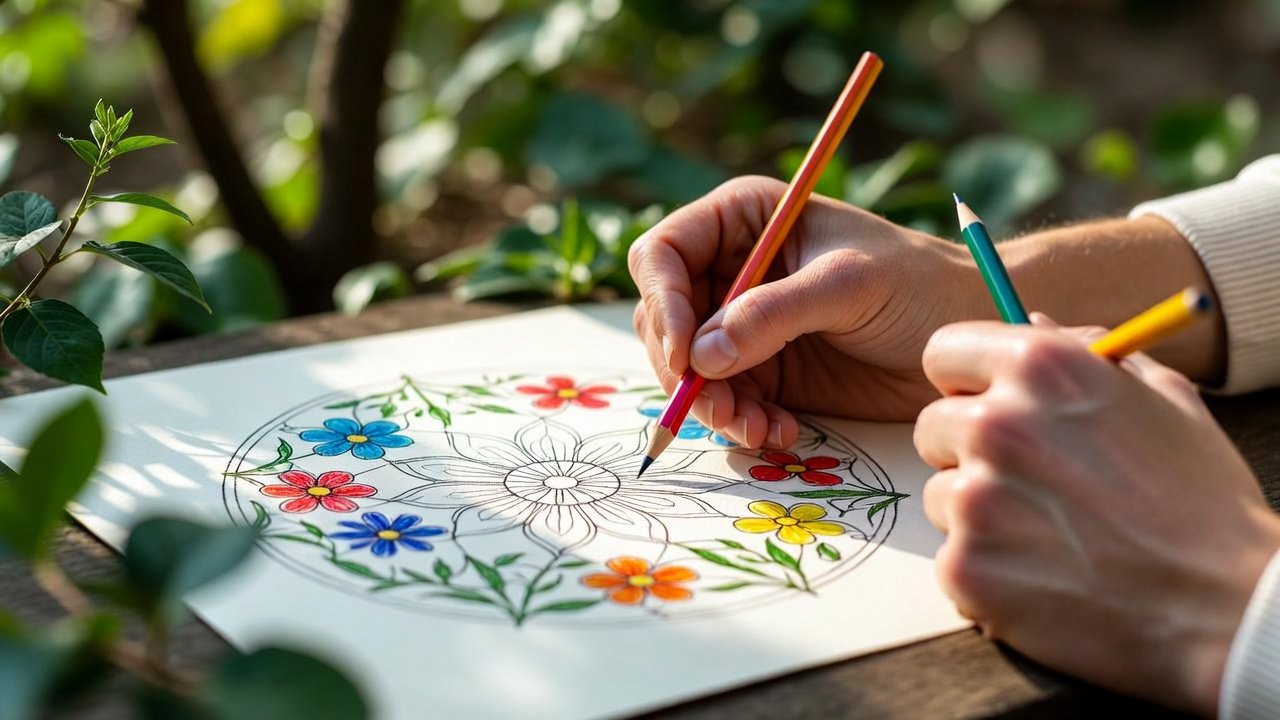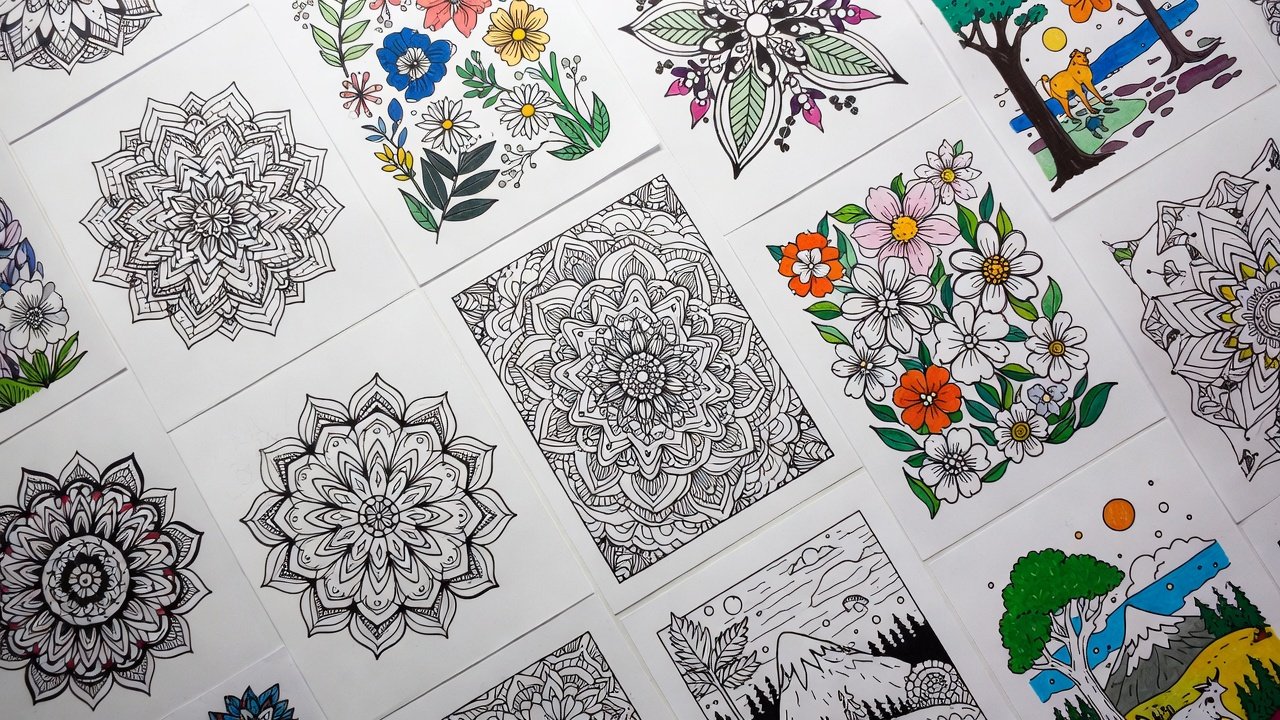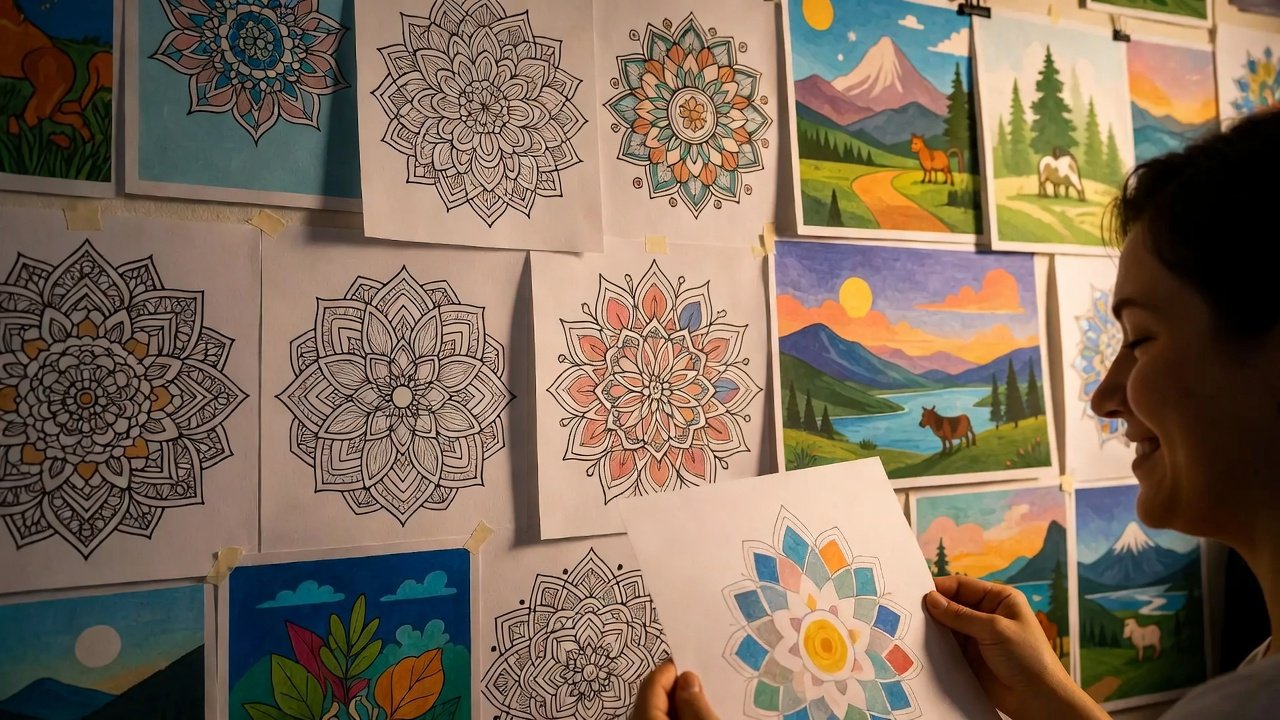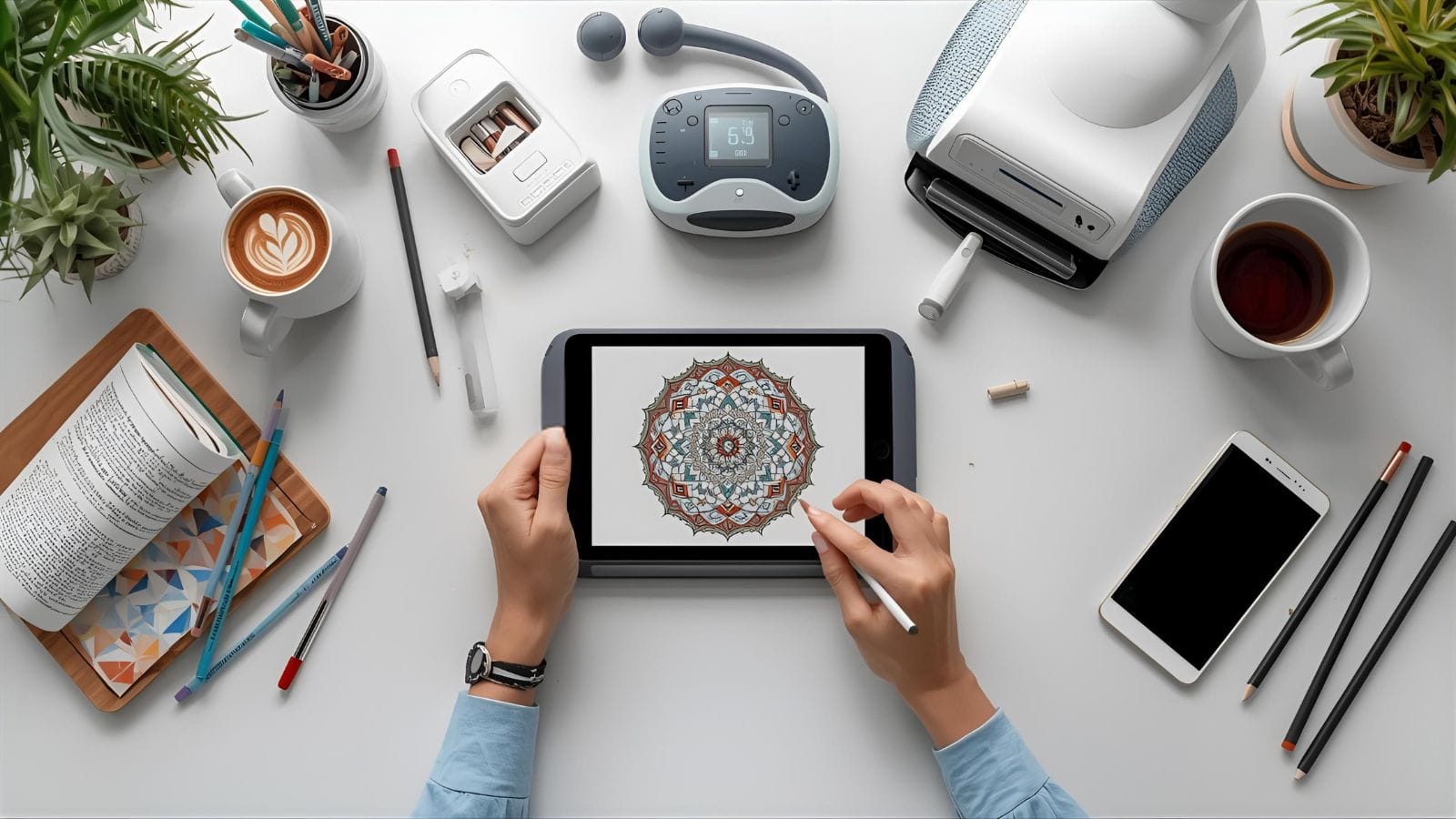Benefits of Coloring for Stress Relief: Your Complete Guide to Coloring Therapy
In our fast-paced, always-connected world, finding practical stress-relief activities can feel overwhelming. Yet one of the most accessible and scientifically backed approaches might surprise you: coloring for stress relief. What began as a simple childhood activity has evolved into a recognized form of coloring therapy, with adult coloring books providing stress relief and helping millions manage stress, reduce anxiety, and reclaim their mental peace.

The Science Behind Coloring Therapy and Stress Relief
When you open adult coloring books for stress relief and begin filling in intricate patterns, something remarkable happens in your brain. Research on coloring therapy has shown that this seemingly simple activity activates the same neural pathways as formal meditation, creating a state of flow that quiets anxious thoughts and a racing mind. The benefits of coloring for adults are measurable—studies show that coloring for anxiety produces fundamental changes in brain activity, making it a potent stress relief activity.
But how does coloring reduce stress? Adult coloring books stress relief works because they engage both hemispheres of your brain simultaneously. The logical left side handles structure, boundaries, and color selection, while the creative right side focuses on artistic expression and emotional processing. This whole-brain engagement in coloring therapy creates a meditative state that naturally lowers cortisol (the stress hormone) and activates your parasympathetic nervous system—your body’s natural relaxation response.
Why Coloring for Stress Relief Is So Effective
The rise of adult coloring books for stress relief represents a significant shift in how we approach mental wellness and therapeutic coloring. Unlike traditional therapy, which may require working with a professional, coloring for relaxation makes stress relief accessible to anyone, anywhere. This democratization of therapeutic practice has opened the door for millions to experience the benefits of coloring for adults that were once only available in clinical settings.
Coloring therapy removes the intimidation factor often associated with creative expression. The lines are already there, the composition is set—you bring your color choices and presence. This structure makes art therapy coloring accessible to those who might say, “I’m not artistic,” while still providing the profound mental health benefits of creative engagement.
The effectiveness of coloring for anxiety lies in its ability to create what psychologists call “flow state.” When you’re fully absorbed in selecting colors and filling patterns during therapeutic coloring, your worried mind takes a rest. This break from anxious rumination through stress-relief coloring allows your nervous system to reset, providing lasting relief that extends beyond your coloring session.

Mandala Coloring Stress Relief: A Specialized Therapeutic Approach
Among the various approaches to coloring for stress relief, mandala coloring holds a special place in therapeutic practice. These circular, symmetrical patterns have been used for centuries across cultures as meditation and healing tools. Modern coloring therapy has embraced mandalas because their repetitive, geometric nature creates a natural rhythm that guides anxious minds toward calm.
When you work with mandala designs for coloring for anxiety, you’re engaging in a practice that combines ancient wisdom with contemporary understanding of stress management. As you color from the center outward (or vice versa), you’re participating in a form of moving meditation that practitioners of coloring therapy recognize as particularly effective for managing stress and worry.
For those specifically struggling with anxiety, guided mandala practices for anxiety offer structured approaches that maximize the therapeutic coloring benefits of these powerful designs.
Creating Your Personal Mindful Coloring Practice
The beauty of using coloring for stress relief lies in its flexibility and accessibility. You can engage in mindful coloring for five minutes during a lunch break or settle in for an hour-long therapeutic session on a quiet evening. The key is finding what works for your lifestyle and mental health needs.
Starting a stress-relief coloring practice doesn’t require expensive equipment or specialized training. Quality coloring books for anxiety and stress, with designs that appeal to you, and basic coloring tools can be enough to begin experiencing significant benefits. For those ready to make coloring for relaxation a consistent part of their self-care routine, learning how to create a daily coloring ritual can help establish this beneficial habit.

The Benefits of Coloring for Adults Beyond Immediate Stress Relief
While stress relief is often the primary reason people turn to therapeutic coloring, the benefits of coloring for adults extend far beyond immediate calm. Regular engagement in coloring for mental health can:
- Improve focus and concentration: The sustained attention required for stress relief coloring strengthens your ability to concentrate in other areas of life. This benefit is particularly valuable for those whose anxiety manifests as scattered thoughts and difficulty focusing.
- Enhance emotional regulation: Coloring for anxiety provides a safe, non-threatening outlet for processing emotions. The combination of color and form in therapeutic coloring can help you explore and express feelings that might be difficult to verbalize, much like using color to explore feelings in traditional therapy settings.
- Boost creativity: Regular engagement with mindful coloring can reawaken dormant creative instincts, leading to fresh perspectives in problem-solving and daily life. This innovative activation is a core principle of coloring therapy.
- Promote better sleep: The calming effects of an evening coloring for relaxation session can prepare your mind and body for restful sleep, contributing to overall stress management through improved rest.
Adult Coloring Books Stress Relief: Printable Options for Easy Access
One of the most significant advantages of modern coloring for stress relief is the vast availability of printable options. Whether you prefer intricate botanical designs, geometric patterns, or themed collections, there are stress relief coloring pages for every preference and stress management need.
The convenience of printable adult coloring books as stress relief options means you can curate your own collection based on your current emotional state. Feeling overwhelmed and needing immediate stress relief? Reach for simpler mandala patterns. Need a longer, more immersive coloring experience for relaxation? Select complex, detailed designs that demand your full attention.

Combining Coloring for Stress Relief with Other Wellness Practices
Coloring therapy doesn’t exist in isolation—it’s most powerful when integrated into a broader approach to mental wellness and stress management. Many practitioners find that combining mindful coloring with journaling creates a particularly effective self-care practice. The creative journaling and coloring combo for well-being approach allows you to process thoughts and emotions through words while also engaging in the meditative benefits of coloring for relaxation.
This synergy between different therapeutic methods creates multiple pathways to stress relief. You might journal about your day’s challenges, then transition to stress-relief coloring to release the stress those reflections brought up. Or you might engage in mindful coloring first, using the meditative state created by this practice to access more profound thoughts and insights for journaling.
Choosing Materials for Your Stress Relief Coloring Practice
While you don’t need expensive supplies to benefit from coloring for stress relief, having materials you enjoy using can enhance the experience. Colored pencils offer precision and blendability; markers provide bold, satisfying color; and gel pens create unique effects and a shine. Experiment to find what feels best in your hand and produces results that make your coloring therapy practice personally meaningful.
The paper quality of adult coloring books and stress-relief materials matters significantly. Thicker paper prevents bleed-through and allows for layering colors, creating more satisfying results that reinforce the positive feelings associated with your stress management practice. Many high-quality coloring books for anxiety and stress now come optimized for various coloring mediums, ensuring your finished pieces look as beautiful as you imagined.
Coloring Therapy: A Holistic Approach to Stress Management
Coloring for stress relief is more than just a hobby—it’s a gateway to accessible therapeutic practice and proven stress management. When you approach mindful coloring with intention, treating it as a legitimate stress-relief activity rather than a mere distraction, it becomes a powerful tool for nourishing your inner world and managing stress. This shift in perspective transforms a simple activity into a profound practice of self-compassion and presence through mindful creativity and wellness.
The coloring therapy approach recognizes that you’re not just filling in pictures—you’re engaging in a clinically-supported practice for stress relief and emotional wellness. Each therapeutic coloring session is an opportunity to practice mindfulness, process emotions, and create tangible beauty in your life.

Making Stress Relief Coloring a Sustainable Practice
The key to achieving long-term benefits from coloring for stress relief is consistency, not pressure. This approach to mindful coloring isn’t about perfection or creating museum-worthy art—it’s about showing up for yourself regularly and engaging in an activity that brings you peace. Some days you might work on stress relief coloring for thirty minutes, other days just a few mindful minutes before bed. Both sessions provide valuable therapeutic benefits.
Consider setting aside a dedicated space for coloring and relaxation. This doesn’t need to be elaborate—a corner of a table with your coloring supplies within reach is enough. Having a designated spot signals to your brain that this is your refuge for stress management, your place of calm amidst life’s chaos.
Recommended Resources for Your Coloring for Stress Relief Journey
To support your coloring therapy practice and maximize the benefits of coloring for adults, here are some exceptional resources that offer variety and quality:
Fantastic Mandala Coloring Bundle: 150+ Premium Printable Pages. For those drawn to the meditative qualities of mandala coloring for stress relief, this comprehensive collection offers months of therapeutic experiences. With over 150 intricate designs, you’ll never run out of new patterns for stress management, each one offering a unique pathway to relaxation and focus through therapeutic coloring.
Adult Coloring Pages Printable Bundle – 120+ Mindful Designs. This diverse collection brings together a wide variety of adult coloring books and stress-relief pages designed for mindful coloring and stress management. From nature scenes to abstract patterns, these pages offer something for every mood and moment in your coloring practice for relaxation.
Color Me a Mood: 40+ Mindful Emotion Coloring Pages for Adults with Affirmations Combining coloring for stress relief with positive affirmations, this unique collection helps you not only process emotions through coloring therapy but also reinforce positive mental patterns. Each page is designed to support emotional wellness, stress management, and creative expression.
The Ripple Effects of Regular Coloring for Stress Relief
As you establish a regular coloring therapy practice, you may notice the benefits of coloring for adults extending beyond your coloring sessions. The patience developed while working on intricate designs can translate to greater tolerance for life’s challenges. The focus required for stress-relief coloring can improve your concentration at work and in daily tasks. The simple joy of creating something beautiful through therapeutic coloring can remind you of life’s simple pleasures.
Many practitioners of coloring for relaxation report that their practice has helped them develop a more compassionate relationship with themselves. Mistakes on the page—a color that doesn’t work, a line crossed accidentally—become opportunities to practice self-acceptance rather than criticism. This gentler self-talk fostered by mindful coloring can gradually permeate other areas of life, contributing to overall stress management.
Embracing Imperfection in Your Coloring Therapy Practice
One of the greatest gifts that coloring for stress relief provides is the permission to embrace imperfection. Your colored page doesn’t need to match any ideal—it simply needs to reflect your choices in that moment. This acceptance of “good enough” can be profoundly liberating in a world that constantly demands perfection, making it a crucial element of practical stress relief activities.
The colors you choose in your therapeutic coloring, the sections you decide to complete or leave blank, the pressure you apply to your coloring tool—all of these are expressions of your current state of being. In coloring therapy, there’s no right or wrong way to color, just your way. This freedom within structure is both comforting and empowering, contributing significantly to the practice’s stress-management benefits.

Your Coloring for Stress Relief Journey Begins Now
The path to stress management through coloring therapy doesn’t require special skills or artistic talent—just a willingness to pick up a coloring tool and make your first mark. Whether you’re dealing with daily stress, chronic anxiety, or simply seeking peaceful stress relief activities for quiet moments, coloring for stress relief offers a gentle, accessible pathway to greater well-being.
As you explore the benefits of adult coloring books for anxiety, remember that every person’s journey toward stress management is unique. What brings one person peace might look different from what works for you, and that’s perfectly okay. The invitation is to experiment, to play with colors and patterns, and to notice what happens when you permit yourself to create without judgment.
Start small if needed—even five minutes of focused therapeutic coloring can shift your nervous system from stress to calm. Over time, you may find that these moments of mindful coloring become an essential part of your stress relief routine, a reliable sanctuary you can return to whenever life feels overwhelming.
The simple act of engaging in coloring therapy can indeed transform your relationship with stress, anxiety, and your own creative spirit. Your journey with stress relief coloring awaits—all you need to do is choose your first color and begin.
Frequently Asked Questions About Coloring for Stress Relief
Q1: How long should I practice coloring for stress relief each day to see benefits?
A: There’s no magic number, but research on coloring therapy suggests that even 10-15 minutes of focused mindful coloring can activate relaxation responses and provide measurable stress relief. Many people find that 20-30 minute sessions offer the sweet spot for entering a meditative flow state and experiencing the full benefits of coloring for adults. The key is consistency over duration—engaging in stress-relief coloring for 10 minutes daily is often more beneficial for stress management than occasional hour-long sessions. Listen to your body and schedule; some days you might engage in therapeutic coloring for just five mindful minutes, other times you’ll lose yourself for an hour. Both provide valuable benefits.
Q2: Does coloring help with stress as effectively as meditation?
A: Yes! Coloring as meditation activates many of the same neural pathways as traditional meditation practices. Studies have shown that mindful coloring can lower activity in the amygdala (the brain’s fear center) and reduce cortisol levels, providing genuine stress relief. While coloring therapy may not replace a comprehensive meditation practice for everyone, many people find this approach more accessible than sitting meditation, especially when starting. The repetitive, structured nature of stress relief coloring provides an anchor for the wandering mind, making it an excellent gateway to other mindfulness practices and a powerful tool for stress management.
Q3: What makes adult coloring books stress relief different from regular coloring books?
A: Adult coloring books and stress relief materials are designed explicitly with therapeutic benefits and stress management in mind. They typically feature patterns that promote focus and flow states—such as mandalas, nature scenes, and geometric designs with moderate complexity. These coloring books for stress management strike a perfect balance for coloring therapy: intricate enough to require concentration (which quiets anxious mental chatter) but not so complex as to cause frustration. Regular coloring books may be too simple or too complicated, or designed purely for visual appeal rather than therapeutic benefit. Adult coloring books, explicitly marketed for relaxation and stress management, have been carefully designed to maximize their mental health benefits.
Q4: Can coloring therapy help with specific mental health conditions like depression or PTSD?
A: While coloring therapy for depression and anxiety shouldn’t replace professional treatment, it can be a valuable complementary tool for managing various mental health conditions. Therapeutic coloring is used in clinical settings to help people process trauma, manage depression symptoms, and cope with anxiety disorders for genuine stress relief. The nonverbal nature of coloring for mental health can be beneficial for those who struggle to express feelings verbally. However, if you’re dealing with severe mental health challenges, coloring therapy works best as part of a comprehensive treatment plan that includes professional support.
Q5: Do I need expensive supplies to get the benefits from coloring for stress relief?
A: Absolutely not. While quality materials can enhance the experience, the stress-relief benefits come from engaging in therapeutic coloring itself, not from the tools. A basic set of colored pencils and well-designed stress relief coloring pages is perfectly sufficient to start experiencing stress management benefits. Many people start with basic supplies and gradually upgrade as they discover what they enjoy most in their coloring-for-relaxation practice. The most important investment is your time and attention to stress-relief activities, not your art supplies.
Q6: What type of designs work best for coloring for anxiety and stress relief?
A: Mandala coloring stress relief designs are particularly effective because their symmetry and predictable structures are inherently calming. Nature-based designs in coloring books for anxiety and stress, such as florals and landscapes, also work well because they connect you with peaceful imagery. For acute anxiety, simpler patterns with larger spaces in your stress relief coloring allow you to see progress quickly, which can be soothing. When you’re feeling more stable, more intricate designs can provide more extended periods of focused engagement, leading to more profound therapeutic benefits. Experiment with different types of coloring for anxiety designs to find what provides the best stress management for your particular nervous system.
Q7: Is it better to practice coloring for stress relief alone or in a group?
A: Both solo and group therapeutic coloring have unique benefits. Solitary coloring for stress relief creates space for introspection and personal meditation, making it ideal for processing individual stress and achieving stress management. Group coloring (sometimes called “coloring circles” or “adult coloring meetups”) adds a social element that can reduce feelings of isolation while maintaining the calming benefits of these stress relief activities. The quiet, focused nature of mindful coloring makes it a comfortable activity for people who find typical social situations draining. You can try both approaches to see what works best for your stress management needs.
Q8: Can coloring for relaxation before bed help with sleep problems?
A: Yes, many people find that stress relief coloring before bed is an excellent sleep hygiene practice that contributes to overall stress management. The focused, screen-free nature of coloring for relaxation helps transition your mind away from the day’s stresses, and the repetitive movements can be naturally sedating. Therapeutic coloring also gives worried thoughts something constructive to do instead of racing. For best results, choose simpler designs in your coloring books for anxiety and stress closer to bedtime (you don’t want to get so engaged that you stay up late!), use warm lighting, and consider it part of a wind-down routine that might also include herbal tea or gentle stretching.
Q9: How do I choose colors when I’m feeling stressed or overwhelmed during coloring therapy?
A: When you’re stressed and using coloring for stress relief, trust your intuition about color choices. Some people gravitate toward cool, calming colors like blues and greens during stressful times, while others find that bright, energetic colors help shift their mood in therapeutic coloring. There’s no wrong choice—this is one of the key benefits of mindfulness coloring. If decision-making feels overwhelming, you might stick to a limited palette (2-3 colors) for your stress-relief coloring or use a monochromatic scheme. The act of choosing colors mindfully—observing what you’re drawn to and how different colors make you feel—is a therapeutic exercise in self-awareness that enhances the stress-management benefits of coloring therapy.
Q10: What should I do if I make a “mistake” while practicing coloring for stress relief?
A: This is a beautiful opportunity to practice self-compassion in your coloring therapy practice. Remember that there are no mistakes in therapeutic coloring used for stress management—only choices and experiments. If you color outside the lines or choose a color you later wish you hadn’t, you can incorporate it into the design, color over it, or accept it as part of your unique creation. How you respond to these moments in your stress-relief coloring can serve as practice for how you react to imperfection in life, contributing to overall stress management. Many people find that their favorite finished pages from coloring for relaxation include “happy accidents” that added unexpected character and deepened their coloring therapy experience.
The simple act of coloring for stress relief can transform your relationship with stress, anxiety, and your creative spirit. Your journey with therapeutic coloring awaits—all you need to do is choose your first color and begin.
Ready to experience these benefits for yourself? Get 5 free printable coloring pages for adults designed specifically for stress relief and relaxation. Download instantly and start your coloring journey today.
6. Offers a Sense of Accomplishment
In a world where many tasks feel never-ending, completing a coloring page provides a tangible sense of accomplishment. You start with a blank outline and finish with a beautiful piece of art created by your own hands.
This sense of completion releases dopamine, the feel-good neurotransmitter, which boosts your mood and motivation. Unlike many stressful tasks that seem to multiply, a coloring page has a clear beginning and end.
7. Requires No Artistic Skill
One of the most appealing aspects of adult stress relief coloring benefits for stress is that it requires no artistic talent or training. You don’t need to worry about drawing, composition, or whether your work is “good enough.”
The designs are already created for you—all you need to do is choose colors and fill in the spaces. This eliminates the performance anxiety that can come with other creative activities and allows you to enjoy the process.

8. Improves Focus and Concentration
Regular coloring practice can actually improve your ability to focus and concentrate in other areas of your life. As you train your mind to stay within the lines and choose appropriate colors, you’re strengthening your attention.
This improved focus can translate into better concentration at work, enhanced problem-solving, and greater capacity to stay present in your daily activities.
9. Provides Affordable Self-Care
Unlike many stress-relief activities that require expensive equipment, classes, or memberships, coloring offers remarkably affordable stress relief. All you need are some coloring pages and basic coloring tools—colored pencils, markers, or crayons you may already have at home.
This accessibility makes it an ideal self-care practice for anyone, regardless of budget. You can practice stress relief without the added stress of financial burden.
10. Creates Moments of Joy and Playfulness
Most importantly, adult coloring for stress relief reconnects us with a sense of play and creativity that many adults have lost. It brings back the simple joy of creating something colorful and beautiful without judgment or pressure.
This playfulness is essential for stress relief. When we allow ourselves to play and create without purpose or productivity in mind, we give our stressed nervous system a much-needed break.
How to Get Started with the Benefits of Coloring Benefits for Stress Relief
Starting a coloring practice is simple. Here are some tips to maximize the stress-relief benefits:
Choose the Right Time: Many people find coloring benefits for stress relief most beneficial in the evening, after work, or during lunch breaks for a midday reset.
Create a Comfortable Space: Find a quiet, comfortable spot with good lighting. Consider playing soft background music if it helps you relax.
Start Small: You don’t need to complete an entire page in one sitting. Even 10-15 minutes of coloring can provide stress relief benefits.
Experiment with Colors: Don’t overthink your color choices. Part of the therapeutic benefit comes from allowing yourself to make intuitive, judgment-free decisions.
Focus on the Process: Remember, this isn’t about creating a perfect finished product. The stress relief comes from the act of stress relief coloring itself, not from the final result.
Make It a Habit: Incorporate stress relief coloring into your daily or weekly routine. Consistency helps maximize the stress-relief benefits.
The Science Supporting Coloring Benefits for Stress Relief
Multiple studies have examined the therapeutic benefits of adult coloring. A study published in the journal Art Therapy found that 20 minutes of coloring could significantly reduce anxiety among college students.
Another study in the Journal of the American Art Therapy Association discovered that coloring mandalas (circular geometric patterns) was more effective at reducing anxiety than coloring on a blank page or free drawing, suggesting that structured coloring activities provide the most benefit.
Mental health professionals increasingly recommend coloring as a complementary tool for managing stress, anxiety, and even depression. While it’s not a replacement for professional treatment when needed, it’s a valuable addition to any self-care toolkit.
Creating Your Personal Coloring Practice for Stress Relief
Establishing a consistent coloring practice is key to experiencing maximum stress-relief benefits. Start small with 10-15 minutes daily, gradually increasing duration as the practice becomes more comfortable and enjoyable.
Consider creating a dedicated coloring space that promotes relaxation – good lighting, comfortable seating, and minimal distractions. Some practitioners find that combining coloring with calming music or nature sounds enhances the stress-relieving effects.
Experiment with different times of day to find what works best for your schedule and stress patterns. Many people find morning coloring helps set a calm tone for the day, while others prefer evening sessions to unwind and process the day’s experiences.
Advanced Techniques for Deeper Stress Relief
As your coloring practice develops, you can explore advanced techniques that deepen the stress-relieving benefits. Master Blending Drawing Techniques to Transform Your Coloring Pages offers valuable insights into creating more sophisticated artwork while maintaining the meditative aspects of coloring.
Color therapy principles can also be incorporated into your practice. Different colors are associated with various emotional and psychological effects—blues for calm, greens for balance, and yellows for joy. Being intentional about color choices can enhance the therapeutic benefits of your coloring practice.
Start experiencing the coloring benefits for stress relief today. Download 5 free relaxing coloring sheets designed for adults—featuring beautiful mandalas, garden scenes, and peaceful designs. Perfect for unwinding after work or enjoying screen-free time. No experience needed. Just print, color, and relax.
Title: FAQ – 10 Proven Benefits of Adult Coloring for Stress Relief
Q1: What makes adult coloring an effective stress relief activity?
A: Adult coloring combines mindfulness with creativity, helping you focus on the present moment. This focus reduces anxiety, calms the mind, and provides a healthy outlet for emotions.
Q2: Can coloring really reduce anxiety and stress levels?
A: Yes. Studies show that engaging in coloring can lower cortisol levels, the hormone associated with stress, and promote relaxation similar to meditation practices.
Q3: How often should I color to experience stress-relief benefits?
A: Even short daily sessions of 15–30 minutes can improve mood and reduce stress. Consistency is more important than duration.
Q4: Do I need to be good at art to get coloring benefits for stress relief?
A: Not at all. Adult coloring is about the process, not the final product. Coloring is calming and therapeutic, regardless of skill level.
Q5: What types of coloring pages are best for stress relief?
A: Intricate designs, mandalas, floral patterns, and nature scenes are particularly effective, as they encourage focus, mindfulness, and repetitive, soothing motions.
Q6: Can coloring help with mental clarity and focus?
A: Yes. Coloring engages the brain’s logic and creativity centers simultaneously, which can improve concentration, problem-solving skills, and mental clarity.
Q7: Is coloring suitable for all ages?
A: While designed for adults, coloring can benefit anyone seeking relaxation and mindfulness. It’s beneficial for those who want a screen-free, creative break.
Q8: How does coloring compare to other stress-relief techniques?
A: Coloring is low-cost, portable, and simple, making it an accessible alternative or complement to yoga, meditation, or journaling for stress reduction.
Q9: Can coloring improve emotional well-being over time?
A: Yes. Regular coloring sessions can boost mood, increase mindfulness, and provide a sense of accomplishment, contributing to long-term emotional wellness.
Q10: What supplies do I need to get started with adult coloring for stress relief?
A: Minimal supplies are needed: a coloring book or printable pages and coloring tools like colored pencils, markers, or gel pens. The key is to choose materials you enjoy using.

What a refreshing take on accessible creativity for stress relief.
Coloring has become my go-to activity when I need to decompress.
This perfectly explains why I lose track of time while coloring.
The link between pattern work and relaxation is beautifully described.